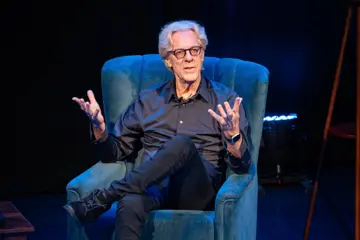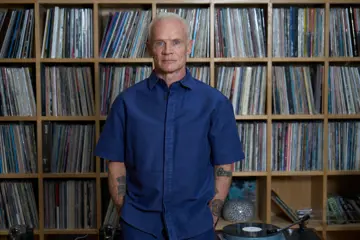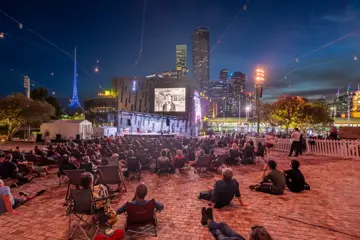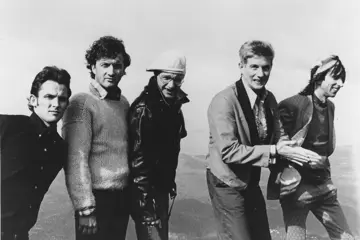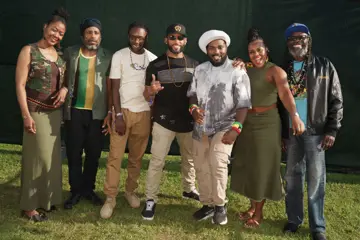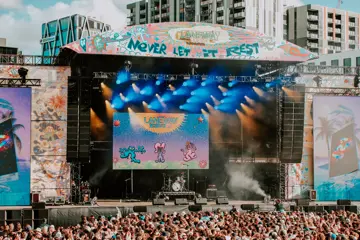“Serenity now!” That’s literally what I yelled at my computer when I realised I was about to get scammed on Facebook while trying to buy tickets to Jason Alexander’s Perth show last week.
The Seinfeld star’s show had sold out well in advance to the tour, but I thought I’d try my luck scoring last-minute tickets via Facebook from a punter who could no longer attend. I searched “Jason Alexander Perth” and two events popped up. Most people, as I did, would click the first one.
I engaged in a conversation with someone selling tickets through Messenger and that’s when things got interesting. They were selling two tickets well below face value, which was the first red flag, and the second was they were PDF tickets, which are ridiculously easy to scam people with.
I asked for confirmation that they had the tickets and a screenshot was sent of an email that looked fairly legitimate, if it weren’t for the fact it didn’t mention the venue or city and “Tues 18 Mar” was spelt “The 18 Mar”. Added to that their PayPal “wasn’t set up for Goods & Services payments” and “could only accept Friends & Family”.
“Why do you have issues trusting people?” they asked. I wonder.
The event page, which now looks to have been cleaned up, thanks to Facebook deleting multiple accounts AFTER the event, was flooded with scammers (14 to be exact) and wasn’t even the official event, so there was little that could be done by promoter A-List Entertainment.
Don't miss a beat with our FREE daily newsletter
“Our sold out events are being targeted by multiple scammers and the unsuspecting fans are transferring payments and then their tickets never arrive,” A-List Entertainment’s Karen Laing told The Music.
“We try to maintain a presence on our artist social pages warning them of these scams but people are still going through with the ‘transaction’. It’s really disappointing for everyone really. I can only believe in Karma.”
“Facebook doesn’t provide promoters/event organisers any foolproof measures.”
Scammers infiltrating Facebook events is nothing new, and it’s pretty easy to avoid them if you take a second and use common sense, but the fact it’s still so widespread is where the real issue lies.
The official Jason Alexander Perth Facebook event, hosted by A-List Entertainment, had posting turned off for guests, which is a great way to stop scammers on events, but won’t stop them altogether.
“[Posts from scammers] changed over the last few weeks from ‘not being able to attend due to schedule change’ to now adding that there has been a medical reason to not attend,” Laing said.
“One scammer ‘George Selwyn’ apparently purchased tickets for multiple artists in completely different states and then listed as not being able to attend – bad planning on their part really.”
Promoters Frontier Touring often engage with fans via their official Facebook events, sharing set times or important show information, all of which is valuable to fans. Even if promoters turn off posting for guests on an event, scammers can (and will) contaminate posts from promoters with things like “I have tickets for sale at a reduced price”, which is exactly what happened to A-ha and Tool events around the country, both of which Frontier hosted.
A Frontier spokesperson told The Music that “Facebook doesn’t provide promoters/event organisers any foolproof measures” when it comes to monitoring scammers.
“All our Facebook events are built so that an admin must approve any posts made to the page – this means that we can still encourage a community within each event while filtering out any suspicious resale posts,” they said.
“We also run a keyword filter across our Facebook page and events but we can’t exactly include words like ‘tickets’ and ‘sale’ in the filter as they’re words we commonly use in our own social posts! Scammers have also figured out these keyword filters and begun posting their sale posts as images/screenshots so that they’re unscannable.”
Most comments will appear hours before a show starts too, which compounds the problem as organisers of events are trying to deal with a lot of other things at that time and monitoring Facebook events can be a timely activity.
“At any given time we can have at least 100 events on the go, so the time it takes to complete this task can really stack up,” Frontier said.
“The process also has its flaws as there’s no easy way to distinguish between a ‘genuine’ reseller and a scammer based on the small amount of information provided to us.”
One scammer selling Jason Alexander tickets, seemingly based in Nigeria, appeared to be using his own profile, which had been operational for years, and he’d simply made a random women’s photo his profile picture that afternoon and began posting in the event page.
Others will create profiles the day or the week of an event, upload a handful of images of some stranger and then begin posting. A lot of profiles I reached out to had uploaded all of their images that week or the same day.
A fake profile advertising tickets on the official A-Ha Melbourne event page (on a post about playing times), had posted the exact same thing on the official Brisbane event page for comedian Jonathan Van Ness, hosted by TEG: “Selling 4x tickets pm me.”
I messaged the scammer asking if the tickets were still available and if they could send confirmation they actually had them. The user said they could but asked me to like or comment on the post in the event first. They had so many posts going across different events they didn’t know which one I referring too (I purposely didn’t say the artist’s name when making contact).
Others tried to call via Facebook after I reached out, but I wasn’t game enough to answer. Some of them tried to call four or five times and one, when presented with a story of how my fictitious cat had just died and I thus I could no longer go, kept pushing.
Once a desperate fan makes contact with a scammer and pays through a non-secure method (PayPal via Friends & Family, Cash App, etc.), there’s little that can be done.
“If you have been the victim of a scam you should report it to the platform and the payment service used,” an ACCC spokesperson told The Music.
“You can also report a scam to Scamwatch.”
“I don’t understand how these big companies can let this happen."
There have been reports of Facebook scammers for years now and nothing has changed – if anything, according to A-List, who said fans get scammed “all the time”, it’s getting worse.
“It’s becoming an epidemic,” Laing said.
“These scammers have multiple fake accounts – not sure how they get through the FB sign up. We stop comments now on sold out events but the scammers can still post in existing comments. This is not ideal for us.
“We want to tell people our events are selling out, it’s good for our business and the artist. The most frustrating thing is that the artists spend months writing and creating new shows that they can then present to the public and between these people and Viagogo (amongst others) they are losing out on income that they rightly deserve, not some deadbeat opportunist who can’t be bothered earning a living legitimately.
“I don’t understand how these big companies can let this happen. It’s their platform and therefore their responsibility. Facebook: make it harder for people to open fake accounts. Google: Stop Viagogo advertising on the front page. It’s simple really, but when money is involved.”
Ultimately, Facebook’s lack of commitment to stopping or slowing scammers is having a much wider larger effect.
“Facebook invests a significant amount into developing automation and AI technology – particularly for the purpose of identifying its users and their behaviour,” Frontier said.
“It feels like a no brainer to apply that technology to better identify potential scammers based on their activity on the platform. At the moment, the very basic tools available to us – manually approving posts and turning off comments on an event post – are restricting our ability to grow and encourage a community of genuine music fans within the events.”
The Music reached out to Facebook for comment and they deleted one fake account in response. They also pointed out that they deleted 1.7 billion fake accounts between July and September 2019. Which, it seems, is nearly not enough.




